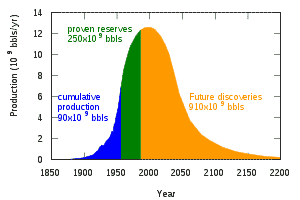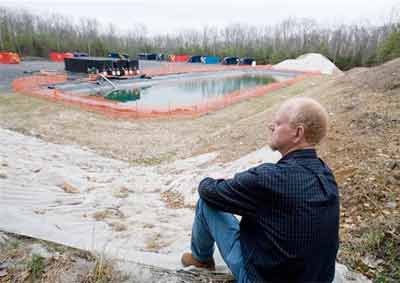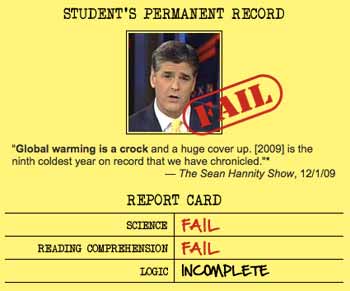Biblio
A logistic distribution shaped production curve, as originally suggested by M. King Hubbert in 1956.
See the U.S. Department of Energy (DOE), International Energy Outlook, for information on energy trends.
The Energy Policy Act of 2005 (Pub.L. 109-58) is a bill passed by the United States Congress on July 29, 2005, and signed into law by President George W. Bush on August 8, 2005, at Sandia National Laboratories in Albuquerque, New Mexico. The act, described by proponents as an attempt to combat growing energy problems, changed US energy policy by providing tax incentives and loan guarantees for energy production of various types.
Criticisms
The Washington Post contended that the spending bill is a broad collection of subsidies for United States energy companies; in particular, the nuclear and oil industries.
..."House Majority Leader Tom DeLay (R-Tex.) also managed to insert at least $500 million in subsidies over a 10-year period -- with the option to double the amount -- for research into deep-water oil and gas drilling, a grant that many lawmakers expect to go to the Texas Energy Center in DeLay's home town of Sugar Land. The bill also includes royalty relief for deep-water drilling projects, a strategy that helped jump-start production in the Gulf during the 1990s..."
Senator Hillary Rodham Clinton made the bill an issue in the 2008 Democratic Primary by criticizing Senator Barack Obama’s two votes supporting the bill, calling it the "Dick Cheney lobbyist energy bill."
This bill exempted fluids used in the natural gas extraction process of Hydraulic fracturing from protections under the Clean Air Act, Safe Drinking Water Act, and CERCLA. The proposed Fracturing Responsibility and Awareness of Chemicals Act would repeal these exemptions.
Please note that information taken from Wikipedia should be verified using other, more reliable sources. It is a good place to start research, but because anyone can edit Wikipedia, we do not recommend using it in research papers or to obtain highly reliable information.
Lively and informative rural American blog based in Austin Texas. This section contains articles on the Environment.
The Daily Yonder's special reports also bring you overviews of the big issues now facing small communities -- health, employment, broadband access, education, and economic development.
The Daily Yonder brings issues and images of the rural U.S. to the fore. We welcome readers from all over to see what's working, failing or never been tried in small communities.
Dee Davis is president and founder of the Center for Rural Strategies, which publishes the Daily Yonder. He is the former executive producer of Appalshop Films/Headwaters Television. Read more about the staff here.
See: Abrahm Lustgarten. "Natural Gas's Climate Benefits Questioned." Daily Yonder. Jan. 25, 2011.
It was thought natural gas easily beat coal when it came to slowing climate change. The EPA finds that thinking needs a revision.
ALBANY, NY (05/04/2011)—The New York Water Rangers, individuals working to protect state waters from dirty gas drilling and hydraulic fracturing, or “fracking,” today thanked the State Assembly’s Environmental Conservation Committee for passing legislation that would close a loophole in state law allowing the gas industry to circumvent requirements for the management and disposal of hazardous waste (A.7013 / S.4616).
The Defining Hazardous Fracking Waste bill would update state law so that any drilling waste that meets the characteristics of hazardous waste is subject to all state regulations related to its generation, transportation, treatment, storage, and disposal.
“Why should the gas industry get a free pass on hazardous fracking waste? If wastewater generated by dirty gas drilling and fracking is hazardous, it must be treated as such in order to protect the health and safety of our communities and our waters.”
The New York Water Rangers are now calling on members of the Assembly Codes Committee to pass the bill without haste and keep it on track.
A new Marist College poll revealed that 41 percent of New Yorkers oppose fracking, and 21 percent aren’t sure where they stand on the issue. We’re committed to educating these undecided New Yorkers, especially the state lawmakers among them.
------------------------------------------------
Environmental Advocates of New York's mission is to protect our air, land, water and wildlife and the health of all New Yorkers. Based in Albany, we monitor state government, evaluate proposed laws, and champion policies and practices that will ensure the responsible stewardship of our shared environment.
We work to support and strengthen the efforts of New York's environmental community and to make our state a national leader.
Photo By Kalim A. Bhatti, for USA Today. 4/28/2010.
Bob Myers, an avid hiker, in Lock Haven, Pa., has become concerned that state forests are being freely leased to drilling firms, leading to clear-cutting of forests, sludge pits and risks of accidents.There have been many incidents of water contamination and even buildings exploding because of natural gas hydro-fracturing operations. The most common problem is methane migration due to defective casing.
According to the Pittsburgh Geological Society's article "Natural Gas Migration Problems in Western Pennsylvania" methane migration occurs when natural gas escapes "from the reservoir rock, coal seam, pipeline, gas well, or landfill. If the gas migrates through the bedrock and soil, it can result in an explosion capable of damaging property and causing loss of life."
Bob Myers has written an informed overview on the impact and consequences of hydraulic fracturing in Pennsylvania. In the section titled, "The Pennsylvania Natural Gas Industry Wall of Shame", he lists violations and pollution from 2009-2010.
Supporters of the gas industry often claim that we have nothing to fear from the big, reputable companies. But, the incidents listed above were caused by Cabot, Range Resources, Anadarko, Chesapeake, East Resources, Talisman, Fortuna. Who's left?"
Professor Myers received his Ph.D. from Penn State in 1991. He teaches American Literature, and has published a biography of the author Harold Frederic, as well as several articles on late-19th-century literature.
See: Ramon Alvarez. April 16, 2010. "Barnett Shale gas producers caught with their hands in the cookie jar".
"Natural gas producers should not impede the city’s efforts to better characterize their industry's air pollution. After all, if industry’s claims are true that the natural gas production in Fort Worth does not produce harmful emissions, then they should have nothing to fear from a thorough and independent city-sponsored study."
An Uncommon Approach: Four Core Strategies
Founded in 1967 as the Environmental Defense Fund, we tackle the most serious environmental problems with:
See our history of results.
NEW ORLEANS, Louisiana, August 30, 2010 (ENS) - Two environmental groups Friday filed a motion to intervene in the lawsuit brought by Texas Attorney General Greg Abbott and the State of Texas against the U.S. Environmental Protection Agency regarding the EPA's June 2010 disapproval of part of Texas' air permitting program.
Environmental Defense Fund and Environmental Integrity Project filed the motion in the U.S. Court of Appeals for the 5th Circuit in New Orleans.
The environmental groups are seeking to intervene on the side of the EPA. If they are allowed to intervene, they will argue that the agency properly disapproved the Texas Flexible Air Permitting program.
"Governor [Rick] Perry wants people to think that Washington is picking on him," said EDF energy program director Jim Marston. "The truth is he wants Texas to get a special pollution pass that no other state gets."
"All other 49 states follow the Clean Air Act, and it's time that politicians and polluters in Texas follow it, too," Marston said. "Our intent is to make sure this lawsuit considers the facts and science surrounding this issue and that re-election campaigns aren't waged in the courtroom."
See Molly Ivins. Bushwhacked: Life in George W. Bush's America
EIP combines research, reporting, and media outreach to spotlight illegal pollution, expose political intimidation of enforcement staff, and encourage federal and state agencies to take enforcement action to stop these practices. EIP’s work has been cited in Congressional hearings and debates, in reports by the US General Accountability Office, and in frequent news articles.
...no other organization is so sharply focused on the vigilant enforcement of environmental laws.
See: Gasland - The Debate
"...Environmental issues surrounding the development of CBM resources in the Powder River Basin and elsewhere have provoked conflict among mineral leaseholders, owners of the surface estates, and the public at large.
Citizen suits under the Clean Water Act and the Safe Drinking Water Act, and private tort actions, complicate the development of CBM resources. Despite geographic and geologic differences among areas in which CBM resources have been developed, the core environmental issues are consistent:
(1) Groundwater table drawdown due to pumping large quantities of groundwater.
(2) Disposal of large volumes of produced water.
(3) Methane contamination of shallow groundwater.
(4) Noise pollution from compressors and other sources.
(5) Air pollution from compressor exhaust gases, methane leakage, and dust.
(6) Surface disturbance from construction of roads, pipelines, and other facilities.
In CBM production, water is produced in large volumes and must be disposed of.
Because waters produced from coalbeds are often fresh, and subsurface disposal is expensive, disposal to surface drainages, wherever possible, carries a strong economic incentive.
Such disposal may erode soils and sediments, change microclimate, create unsustainable aquatic habitats, or salinize soils."
The Integrated Petroleum Environmental Consortium (IPEC) is a consortium of the University of Tulsa, the University of Oklahoma, Oklahoma State University and the University of Arkansas at Fayetteville.
Funded by the U.S. Environmental Protection Agency Office of Research and Development, the mission of IPEC is to increase the competitiveness of the domestic petroleum industry through a reduction in the costs of compliance with U.S. environmental regulations.
From EOG website: EOG Resources, Inc. is one of the largest independent (non-integrated) oil and natural gas companies in the United States with proved reserves in the United States, Canada, Trinidad, the United Kingdom and China. EOG Resources, Inc. is listed on the New York Stock Exchange and is traded under the ticker symbol “EOG."
An EOG blew out in Clearville PA. on June 4, 2010.
From Sourcewatch: On June 4, 2010, a western Pennsylvania natural-gas well owned by EOG Resources Inc. blew out, releasing an undisclosed amount of gas and drilling fluids before being contained about 16 hours later, as reported by the Wall Street Journal and The Boston Globe.
Operators at this site were preparing to extract gas after through [hydrofracking]]. In a press release, the Pennsylvania Department of Environmental Protection stated that it would "aggressively investigate" the Marcellus Shale well blowout and that it would take the "appropriate enforcement action."
"As a result, the well released natural gas and flowback (fracturing) fluid onto the ground and 75 feet into the air," the Pennsylvania Department of Environmental Protection said in the press release. It should be noted that EOG Resources is the new namesake for the company formerly known as Enron.
The showdown between House Republicans and the White House over climate change and environmental policies kicks off Wednesday with EPA chief Lisa Jackson as the star witness.
The Energy and Commerce Committee will hold a hearing on legislation floated last week by Chairman Fred Upton (R-Mich.), Rep. Ed Whitfield (R-Ky.) and Sen. Jim Inhofe (R-Okla.) to strip the Environmental Protection Agency of its authority to regulate greenhouse gases under the Clean Air Act.
Jackson last week blasted what she called “draconian measures” aimed at handcuffing her agency, and insisted that the White House would veto legislation to take away its regulatory authority.
“These efforts would halt EPA’s common-sense steps under the Clean Air Act to protect Americans from harmful air pollution that until now has not been regulated at all from any sources in this country,” she said.
According to the American Journalism Review, Politico is a Washington, D.C. based website and newspaper that focuses on Beltway political coverage, started by veteran Washington Post political reporters John Harris and Jim VandeHei started in January 2007.
See: Glenn Greenwald. May 30, 2008. "The right-wing Politico cesspool". Salon.
I once thought that Politico would be a pernicious new addition to our rotted media culture. Instead, it actually provides a valuable service by packing every destructive and corrupt journalistic attribute, in its most vivid form, into one single cesspool.
See: Republicans ask court to toss climate case
See: Smackdown: climate science vs. climate economics
See: EPA in the Crosshairs | Mixplex
See: Beware The Green Dragon! | Right Wing Watch
See: Energy & Commerce Committee Investigates Potential Impacts of Hydraulic Fracturing
When an EPA study concluding that hydraulic fracturing "poses little or no threat" to drinking water supplies was published in 2004, several EPA scientists challenged the study's methodology and questioned the impartiality of the expert panel that reviewed its findings.
See: Halliburton's Interests Assisted by White House - Los Angeles Times.
See: The American Association for the Advancement of Science (AAAS) Reaffirms Statements on Climate Change and Integrity. 12/04/09.
Sean Hannity of Fox News has failed Science.
Can you tell Fact from Science Fiction?
Hydraulic Fracturing Study Plan Review Panel
The Panel will review and provide independent expert advice on EPA’s draft Hydraulic Fracturing Study Plan that will investigate the potential public health and environmental protection research issues that may be associated with hydraulic fracturing.
It will be led by David A. Dzombak, professor of environmental engineering at Carnegie Mellon University.
Legere, Laura. "Peer-review panel for EPA fracking study includes six Pa. scientists." The Scranton Times-Tribune. Jan. 18, 2011.
A panel of geologists, toxicologists, engineers and doctors that will peer-review a high-profile Environmental Protection Agency study of hydraulic fracturing will include six scientists from Pennsylvania, more than any other state.
The panel will review the techniques and analysis the EPA uses to draft a study of the potential environmental and health impacts of hydraulic fracturing - the process used in natural gas exploration of injecting a high-pressure mix of chemically treated water and sand underground to break apart a rock formation and release the gas.
...In a memo announcing the new panel, the EPA found "no conflicts of interest or appearances of a lack of impartiality for the members of this panel."
See: Natural Gas Drillers Protest Nomination of Fracking Critics for EPA Review Panel
See also: Hydraulic Fracturing Study Plan
Determination Memo:
Posted 01/13/2011
Determination Memo for this Activity. (1/27/2011, PDF, 11 pp., 44,581 bytes)
Members:
| Dzombak, David A. | Chair | Carnegie Mellon University | Pittsburgh | PA |
| Alexeeff, George | California Environmental Protection Agency | Oakland | CA | |
| Ballestero, Tom | University of New Hampshire | Durham | NH | |
| Benjamin, Mark | University of Washington | Seattle | WA | |
| Boufadel, Michel | Temple University | Philadelphia | PA | |
| Boyer, Elizabeth | Pennsylvania State University | University Park | PA | |
| Burnett, David | Texas A&M University | College Station | TX | |
| Davis, Thomas L. | Colorado School of Mines | Golden | CO | |
| Dunn-Norman, Shari | Missouri University of Science and Technology | Rolla | MO | |
| Giesy, John P. | University of Saskatchewan | Saskatoon | Saskatchewan | |
| Griffiths, Jeffrey | Tufts University | Boston | MA | |
| Gschwend, Phillip | Massachusetts Institute of Technology | Cambridge | MA | |
| Harris, Cynthia M. | Florida A&M University | Tallahassee | FL | |
| Kim, Nancy K. | Health Research, Inc. | Troy | NY | |
| Lee, Cindy M. | Clemson University | Anderson | SC | |
| Patten, Duncan | Montana State University | Bozeman | MT | |
| Randtke, Stephen | University of Kansas | Lawrence | KS | |
| Reible, Danny | University of Texas | Austin | TX | |
| Schreppel, Connie | Mohawk Valley Water Authority | Utica | NY | |
| Thyne, Geoffery | University of Wyoming | Laramie | WY | |
| VanBriesen, Jeanne | Carnegie Mellon University | Pittsburgh | PA | |
| Vidic, Radisav | University of Pittsburgh | Pittsburgh | PA |
GEMS: Great Environmental Moments in Science |
||
|
||
|
||
|
Executive Message:
...As an agency, we are ready to face scientific challenges in 2011 that range from mountain top mining to hydraulic fracturing to endocrine disruption and more. But the reason it’s so important to invest in the kind of new thinking, methods, and approaches that Administrator Jackson has called for, is to ensure our ability to take on those challenges we can’t foresee. Innovative thinking and sustainable approaches will be out best tools to confront new environmental challenges as they arise.
Sincerely,
Paul T. Anastas
Assistant Administrator
U.S. EPA
Office of Research and Development
History of hydraulic fracturing | criticism of the 2004 EPA study.
I am writing on behalf of the Oil and Gas Accountability Project to provide an impartial analysis of the adequacy of the actions proposed in the subject report. I am a practicing hydrogeologist; I spent 32 years at the U.S. Geological Survey in both management and research positions. I left the USGS in 1995 to become a consultant. I have published more than 100 papers in the refereed scientific literature on various groundwater problems. My resume is attached to this comment.
Coal-bed methane is an energy source that in many places in the United States is associated with underground sources of drinking water (USDW). In some places the coal beds are the best aquifers in the area. In these places the development of CBM is incompatible with the continued use of the coal beds as an aquifer.
There is a direct conflict between national/state energy policy and the preservation of USDW. For example, in the Powder River Basin of Wyoming and Montana the Bureau of Land Management predicts, in their Final Environmental Impact Statement for CBM, that the development will lower the water levels in the coal measures by 600 to 800 feet over much of the basin.
This will make unusable several thousand private water wells that are completed in the coal beds. The law favors the development of the methane over the continued use of the coal beds as aquifers—in this case the best aquifers in the area.
...EPA discounted problems associated with hydraulic fractures based upon a limited sample of identified problems. They relied upon citizen reports almost exclusively. There were no independent surveys, no independent field investigation or other well sampling. The EPA exercise is incomplete at best.
...EPA seems caught up in the conflict between the National Energy Policy of the Bush Administration and the EPA mandate to protect USDW.
Letter written by Hydrology expert, John D, Bredehoeft, to Joan Harrigan-Farrelly: Chief Underground Injection Control, Prevention Program Office of Ground Water and Drinking Water Environmental Protection Agency.
RE: EPA draft study report:Evaluation of Impacts to Underground Sources of Drinking Water by Hydraulic Fracturing of Coalbed Methane Reservoirs: Subject: Federal Register August 28, 2002, Volume 67, Number 10, Pages55249-55251 (water Docket Id no. w-01-09-11).
See also: Bredehoeft, J. (2003). " From Models to Performance Assessment: The Conceptualization Problem." Ground Water, Vol. 41, No.5 pp 571-577.






























